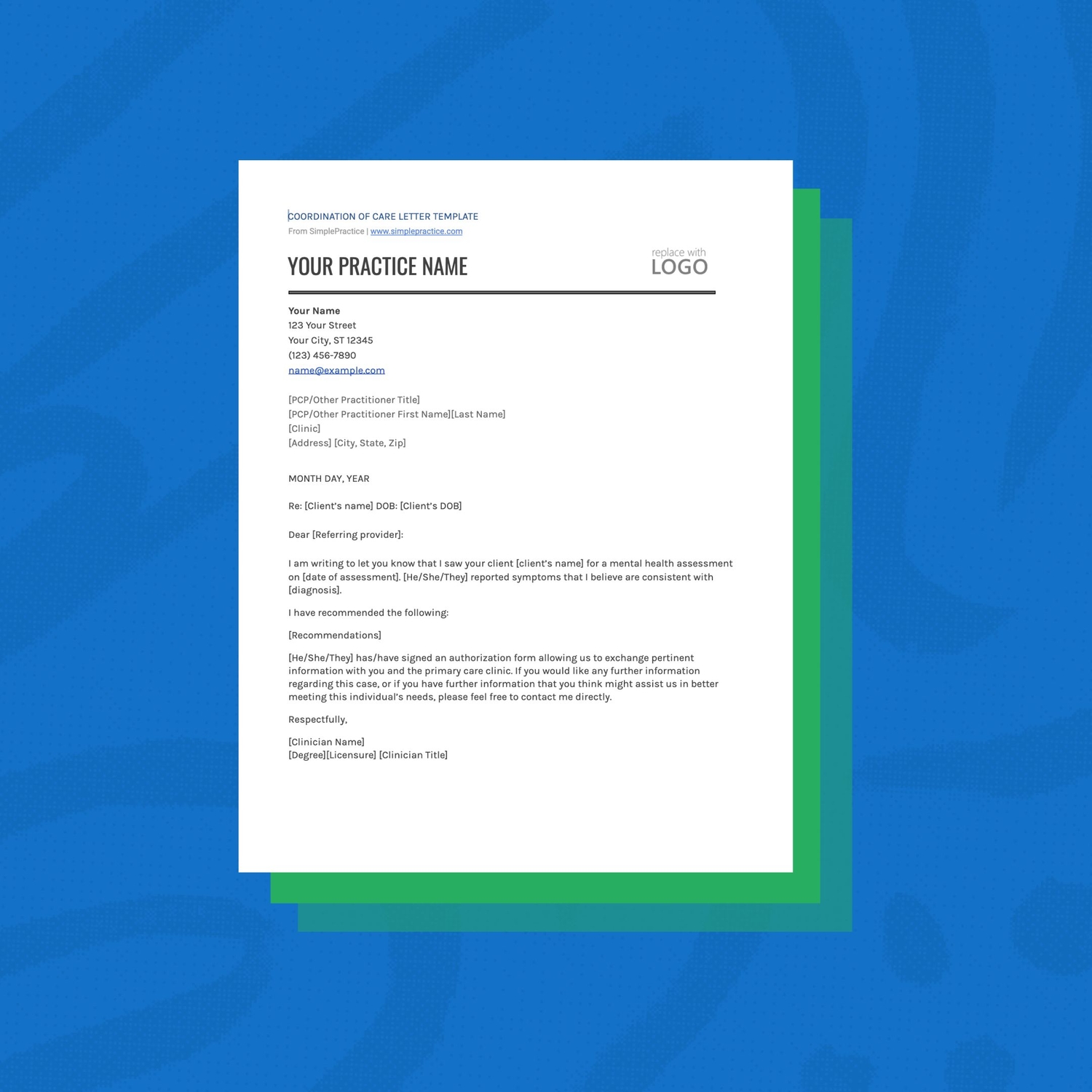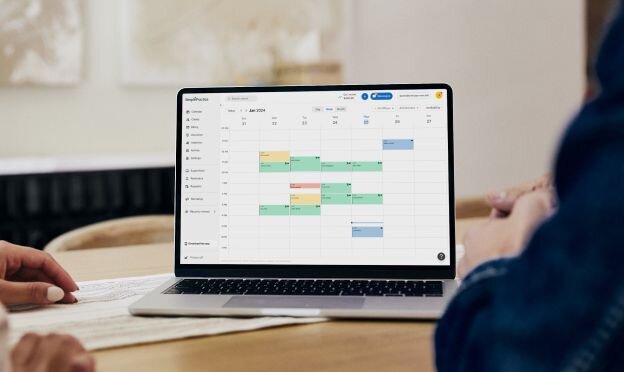Behavioral Health Care Coordination Template
Download the free behavioral health care coordination template
Download free resource
Enter your email below to access this resource.
By entering your email address, you are opting-in to receive emails from SimplePractice on its various products, solutions, and/or offerings. Unsubscribe anytime.

As a mental health therapist, you’ll be involved in several aspects of client care, including diagnosis and treatment. You may also need to get involved in behavioral health care coordination, which is why we’ve created this behavioral health care coordination template to help.
In this article, we provide a comprehensive overview of care coordination, including examples of care coordination and a free, downloadable behavioral health care coordination template that you can customize for your practice, giving you more time to spend with clients.
What are the benefits of behavioral health care coordination?
Before exploring the benefits of care coordination, let’s first define what the term encompasses.
According to the Agency for Healthcare Research and Quality (AHRQ), care coordination involves “deliberately organizing patient care activities and sharing information among all of the participants concerned with a patient's care to achieve safer and more effective care.”
Care coordination is a key component for developing partnerships across different health care settings, and can potentially improve outcomes for patients, providers, and payers alike.
The benefits of care coordination include:
- Personalized care specific to the client’s needs.
- Reduction in delays of communication, closing gaps in continuity of care.
- It informs another clinician of the precise information they need to know to expedite treatment.
- Clients qualifying for medical assistance.
- Helps to address specific care needs of the client by referring the client to the right specialist resources.
- Reduction in overall healthcare costs by streamlining services and treatment.
- Provides better patient outcomes.
- Results in higher client satisfaction.
Examples of care coordination
Depending on the age of your client, you may encounter various examples of care coordination as a behavioral healthcare provider.
We’ve listed several examples of care coordination in various settings below:
- Family care coordination: When treating children or teens under age 14, you may need to engage with their family members—to request their help following through with treatment recommendations or providing any necessary psychoeducation to them—all in the service of assisting the family to better understand and support the client’s mental health.
- School care coordination: You may need to coordinate care with a school social worker regarding referrals and/or discharge recommendations.
- Case management/mental health care coordinator: You may need to enlist the help of a care coordinator, or case manager, whose role is to assist the client and their family by directing them to resources, increasing their access to care, and reducing barriers to treatment and services.
- Specialist care: You may need to refer your client to a specialist behavioral health provider, like a psychiatrist for medication management, or for treatment outside of your area of expertise.
- Medicare care: This includes liaising with a primary or specialist medical provider on a diagnosis that may impact the mental health of your client or referring them for medical treatment.
- Navigating other providers: You may decide to call a provider on behalf of your client who is having trouble obtaining care, such as at-home support services. Sometimes a clinician carries more weight/urgency in getting quick access to support.
What to include in a behavioral healthcare coordination template
There are several elements to consider when coordinating the care of your client. You may want to use a behavioral healthcare coordination template that you can customize for your needs.
Before including any protected health information (PHI), you’ll want to ensure that you have a signed release of information (ROI) from your client. You may have already included this in your intake paperwork with your client, but you’ll want to ensure you have the proper authorizations.
Once you have the ROI, the coordination of care letter template should include the following information:
1. The other provider’s name, title, and address.
2. Your client's name and date of birth.
3. Reasons you are writing to the provider/clinician/social worker/case manager. Include any relevant information, including:
- Your client’s diagnosis
- Your recommendations for treatment
- Your intended role in treatment (if appropriate)
- Any care coordination needs
4. Address any necessary authorization/release of information.
5. Provide further contact information if they wish to discuss the matter further, such as the hours and days you are available. Ensure you include your telephone number, email, and address in the header or footer of the letter/email.
Sample coordination of care letter template
We have created a customizable behavioral health care coordination template to easily communicate any diagnoses, treatment recommendations, or additional information to another care provider your client may be seeing.
If you’re looking for some sample letter template paragraphs, you may find the following examples helpful:
- For a client you have seen: “I am writing to let you know that I saw your client, [client’s name], for a mental health assessment on [date of assessment]. [He/She/They] reported symptoms that I believe are consistent with [diagnosis]. I recommended the following [go on to list each recommendation as a bulleted list].”
- For a client you are referring: “I am referring [name of client] for [insert services/assessment]. It is my clinical opinion that they require [insert care coordination/specialist treatment/psychiatric specialist care - delete as appropriate].”
- ROI sample paragraph: “[He/She/They] has/have signed an authorization form allowing us to exchange pertinent information with you and the [primary care clinic]. If you would like any further information regarding this case, or if you have further information that you think might assist us in better meeting this individual’s needs, please feel free to contact me directly.”
You can also download the free behavioral health care coordination template and save it to your electronic health record (EHR), so you can easily access it and edit it according to your specific client’s needs.
How SimplePractice streamlines running your practice
SimplePractice is HIPAA-compliant practice management software with everything you need to run your practice built into the platform—from booking and scheduling to insurance and client billing.
If you’ve been considering switching to an EHR system, SimplePractice empowers you to streamline appointment bookings, reminders, and rescheduling and simplify the billing and coding process—so you get more time for the things that matter most to you.
Try SimplePractice free for 30 days. No credit card required.

